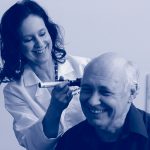Internal Medicine includes cardiovascular care, lung health, gastroenterology, liver and kidney health, and rheumatology including care for auto-immune and inflammatory conditions. Dr. Herdman now prefers the most natural treatments first, with prescription medications as a second choice carefully chosen only if needed. In her first career as an MD and Pathologist, she was taught the foundational assumptions of allopathic medicine: that disease inevitably worsens without pharmaceutical or surgical intervention. Conventional medicine, though it excels at diagnosis, surgery and life-saving emergency treatment, assumes that chronic illness cannot reverse itself.
Natu ropathic medicine, Dr. Herdman’s second career, has an entirely different understanding of illness and healing: Our bodies are responsive systems with a great capacity for cellular change and self-repair. The disease process can reverse, given the right supportive remedies such as botanicals and nutrients, tasty healing foods, homeopathy, mind-body medicine, and appropriate exercise. We can permanently improve body chemistry, and restore healthy functioning. Our patients can achieve an entirely new level of wellness, as vibrant new tissues replace old cells. They often feel increasing vitality as their health and medical tests steadily improve, year after year. Using a wide spectrum of natural remedies, we always focus on treating underlying causes and rebuilding health from the ground up!
ropathic medicine, Dr. Herdman’s second career, has an entirely different understanding of illness and healing: Our bodies are responsive systems with a great capacity for cellular change and self-repair. The disease process can reverse, given the right supportive remedies such as botanicals and nutrients, tasty healing foods, homeopathy, mind-body medicine, and appropriate exercise. We can permanently improve body chemistry, and restore healthy functioning. Our patients can achieve an entirely new level of wellness, as vibrant new tissues replace old cells. They often feel increasing vitality as their health and medical tests steadily improve, year after year. Using a wide spectrum of natural remedies, we always focus on treating underlying causes and rebuilding health from the ground up!
Botanical medicine is a keystone for treating chronic internal medicine health conditions. Herbal remedies are dispensed in various forms: Standardized botanical capsule formulas contain measured doses and strengths of herbs. These may be single herbs or extracts, or synergistic herbal blends where each ingredient enhances the actions of others. Certain herbs work especially well as tinctures: liquid herbal extracts, steeped for months to obtain the maximum potency of active constituents. Dr Herdman may hand-mix a combination of herbs to best address each patient’s health.
Botanicals have several ways of working: They might enhance a natural function or encourage the body to self-repair. For example, herbs for menopausal symptoms can encourage a woman’s body to release balanced amounts of hormones; liver tonic herbs may encourage healthy bile flow and liver cell repair. Botanicals also have another type of action that does not exist in pharmaceuticals: The same herb can act to either stimulate or to calm the function of an organ, depending on the disorder – as if the body and the herb are able to choose the best response. These botanicals capable of restoring balance in this way are called ‘adaptogens’. One example is the use of adrenal adaptogens such as ashwaganda (botanical name, withania) and Siberian ginseng (eleutherococcus) to help the adrenal glands recover from being over- or under-active after stress.